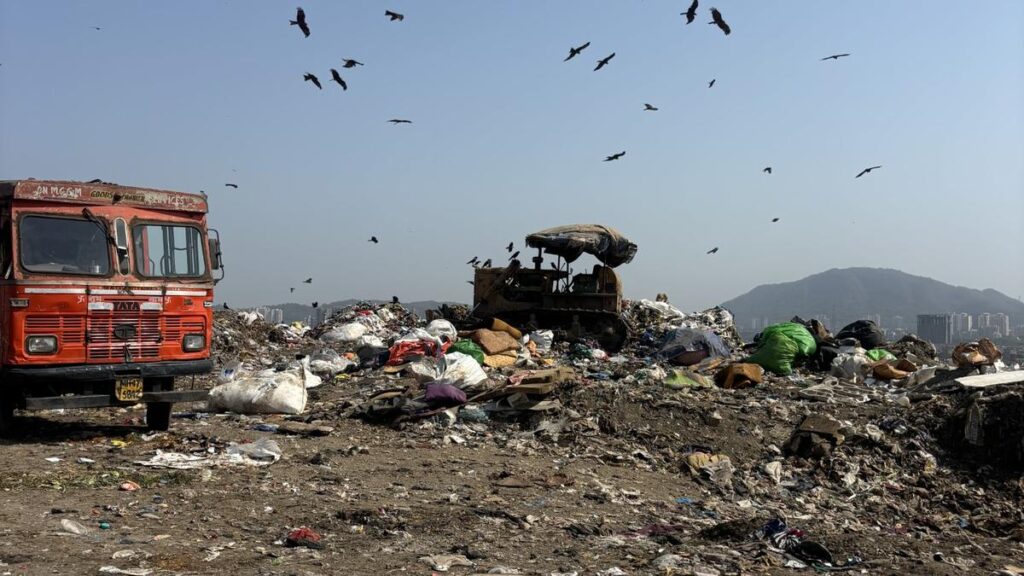The Brihanmumbai Municipal Corporation’s (BMC) proposed 1800 TPD Waste-to-Energy (WtE) plant at Deonar, the site of India’s largest dumping ground, has drawn strong opposition from residents, activists, and legal professionals, who fear the plant will further deteriorate the already poor air quality in the Govandi area, leading to grave public health consequences.
The WtE project, awarded to Chennai MSW Pvt. Ltd., is slated for commissioning by October 2025 at an estimated cost of ₹2,648 crore. The facility, spread over 8.2 hectares, is expected to process 600 metric tonnes of waste daily, generating an estimated 17 million units of energy annually. However, apprehensions persist regarding the emission of harmful gases and its potential to exacerbate respiratory ailments in a region already plagued by tuberculosis, asthma, and chronic obstructive pulmonary disease (COPD).
Zakir (30), a long-time resident of Baiganwadi near the Deonar site, expressed anxiety over the project’s implications. “Every other house here has a TB or asthma patient. Adding another pollutant-emitting project will make survival even harder,” he said. The area, comprising over 200 informal settlements, houses more than one million people, many of whom live in close proximity to the Deonar dumping ground and already report high exposure to toxic emissions.
“This technology may claim to control emissions, but the ground reality is different. I work at the dumping site; I see what happens,” another Baiganwadi resident, also employed at the landfill, said. Residents also voiced concerns that the same area is being earmarked to rehabilitate families displaced under the Dharavi Redevelopment Project.
Legal interventions have also begun to take shape. Advocate Abid Abbas Sayyed has filed formal objections to multiple authorities including the BMC Commissioner, Maharashtra Pollution Control Board (MPCB), and Central Pollution Control Board (CPCB). In his letter, he questioned the environmental clearances granted to the plant, warning that incineration will produce carcinogens, dioxins, furans, carbon monoxide, and sulphur oxides.
“What is the guarantee this plant will not worsen existing respiratory conditions?” Mr. Sayyed asked. He pointed out that the biomedical waste facility set up in 2009 at the same site operated for five years without MPCB clearance. Despite a court order over six months ago mandating its relocation, compliance remains pending.
Residents of Shivaji Nagar, like Aditya (35), shared similar frustrations. “We were told the biomedical plant was safe. But now we wake up to black soot on our vehicles and a constant foul smell,” he said. “The average life expectancy here is reportedly just 39 years. How much more can the BMC extract from Govandi?”
The Govandi New Sangam Welfare Society has filed a petition in the Bombay High Court demanding the closure of the biomedical waste facility run by civic contractor SMS Envoclean Pvt. Ltd. Meanwhile, the MPCB claims it conducted year-long studies before approving the Deonar WtE project. Officer Rakesh Dafade stated that pollution mitigation measures, such as a 50-metre-high chimney and a scrubbing system to remove toxins from exhaust gases, will be implemented.
Still, critics argue that these technical provisions do not address the core issue: lack of waste segregation. “Deonar receives a mix of biodegradable, plastic, hazardous, and biomedical waste with no source segregation,” said Mr. Aditya. “How will the government ensure that only suitable waste is processed for energy recovery?”
Citing Rule 15 of the Solid Waste Management Rules, 2016, Mr. Sayyed’s objection letter highlights the BMC’s alleged failure to ensure segregation at source, scientific processing, and proper waste stream management. He noted that Mumbai’s high organic waste content lowers its calorific value, making it inefficient for incineration—a fact borne out by the closure of seven out of 14 WtE plants across India.
Activists and residents have called for an immediate stay on the project and demanded a fresh Environmental Impact Assessment (EIA) with stakeholder consultations. They have also urged for comprehensive environmental and health impact studies in the area and the formation of a Special Investigation Team (SIT) to audit the functioning of existing WtE facilities nationwide.
An RTI application has also been filed by Mr. Sayyed to seek detailed records on the plant’s clearances, approval processes, and environmental assessments.
As the debate continues, the people of Govandi await clarity on whether the pursuit of energy will once again come at the cost of their health.
Published – May 10, 2025 11:17 pm IST
Source:https://www.thehindu.com/news/cities/mumbai/concerns-mount-over-waste-to-energy-project-at-deonar-amid-pollution-fears/article69560775.ece

